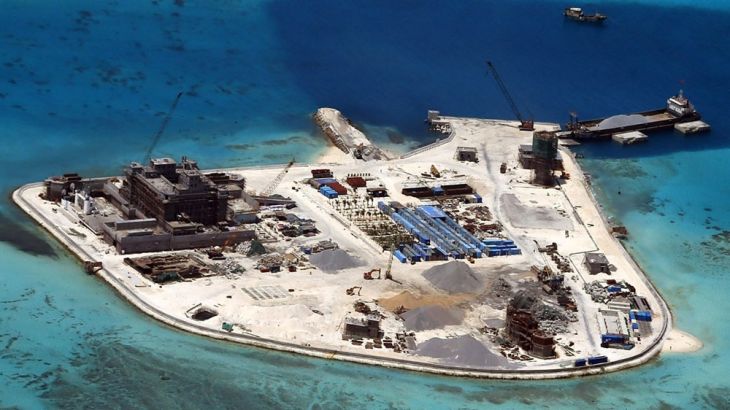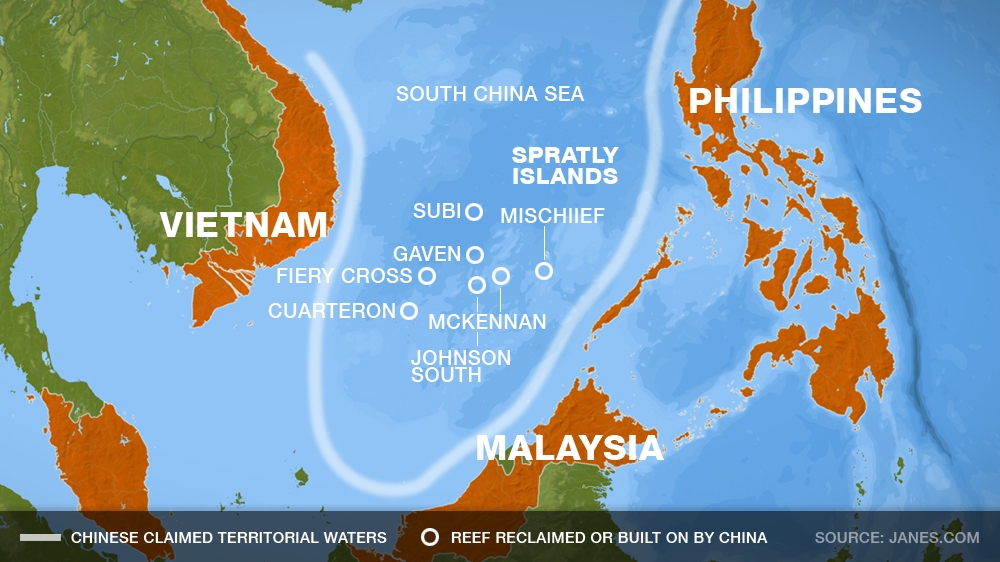Looking for China’s maritime militia
Reporting on groups involved in confrontations with foreign patrol vessels in the South China Sea is proving difficult.

Tanmen, China – We had come to this fishing village on Hainan Island, China’s southernmost province, because it’s home to one of the country’s best-known maritime militias – the Tanmen Maritime Militia Company.
Its recruits are mostly men from the fishing community. They are given basic military training, and their activities, according to the Hainan Daily, include “collecting maritime information … and contributing to sovereignty defence in the South China Sea”.
Keep reading
list of 4 itemsChina coastguard blasts water cannon at Philippine coastguard ship
Philippines and China in new confrontation at Scarborough Shoal
US Congress to vote on aid for Ukraine, Israel, Taiwan: What’s the deal?
Chinese President Xi Jinping cited the Tanmen Maritime Militia as the model for maritime militia building, and honoured them with a visit in 2013.
But while they may be celebrated in local media, we soon found out filming the Tanmen Maritime Militia was not so straightforward.
It was by chance that we spotted them one sunny morning, as we drove past Tanmen Port – around 40 or 50 men, dressed in military fatigues, going through a drill.
What was to prove even more difficult, though, was getting people to talk about the group.
READ MORE: The scramble for the South China Sea
We asked a local official from the propaganda office whether the men we saw were members of the Tanmen Militia. He told us they were part of a film crew. That would have been a bit more believable had we not driven past the film crew just minutes earlier.
A fisherman we interviewed, Wang Shumao, denied knowing anything about the militia. He said the men we saw were just fishermen who “… chose to wear camouflage to protect themselves from the sun”.
But it turned out Wang was not telling the truth about how much he knew about the group.
We found out later that he was not just an ordinary fisherman. He is a deputy commander of the Tanmen Maritime Militia.
He was also on one of the 12 Chinese vessels involved in a standoff with the Philippine Navy at Scarborough Shoal in 2012. He had led an unsuccessful attempt to block Philippine vessels from approaching the shoal.
The Qionghai City Government website published a profile of Wang last year.
Wang did not reveal any of that when we spoke to him, and denied knowing anything about the group.
But why were the Chinese so reluctant to talk to foreign media about the Tanmen Maritime Militia?
READ MORE: Standoff at Scarborough Shoal
Perhaps because of the unflattering reports about China’s maritime militias. These groups have been involved in confrontations with foreign patrol vessels in the South China Sea.
In 2014, boats belonging to maritime militias, together with Chinese coastguard and naval ships, helped form a cordon around an oil rig that the Chinese had installed in disputed waters, to prevent Vietnamese maritime authorities from approaching.
|
|
A year later, fishing vessels believed to be part of several Chinese maritime militias, were reportedly involved in harassing a US navy ship when it sailed near the Spratly Islands in October 2015.
Experts say the use of quasi-civilian forces is a tactic to avoid direct military confrontations, and allows the Chinese government some degree of deniability.
Andrew Erickson, professor at the US Naval War College, told Defense News: “China is trying to use these government-controlled fishermen below the radar to get the bonus without the onus to support its South China Sea claims.”
China, however, denied this. Its foreign ministry spokesman Lu Kang said: “This kind of situation does not exist.”
But China is increasingly assertive, aggressive even in pursuing its territorial claims.
A Pentagon report said that China’s reclamation work has added 1,300 hectares of land on features in the Spratly Islands.
READ MORE: China won’t budge on South China Sea sovereignty
The next phase would probably involve building substantial military infrastructure on the man-made islands.
Lin Yongxin, from the National Institute for South China Sea Studies, dismissed questions about China’s militarisation of the region: “China’s goal is always to provide better public service, including meteorological service and medical help.”
Analysts are in no doubt, however, that China’s expansionist policies in the South China Sea would continue.

Alan Dupont, a non-resident senior fellow for the Washington-based Atlantic Council, said: “It [China] now has the military capability, the political and financial clout to get its way and I think the Chinese have decided that after 100 years of weakness, they now need to assert themselves and claim their rightful position in Asia.”
The fishermen we met in Hainan would have no trouble playing a role in this.
As one of them told us, echoing China’s argument for much of the South China Sea: “The sovereignty absolutely belongs to China. We don’t know what laws should be applied, but our grandfathers’ grandfathers’ grandfathers fished there … We will never allow anyone else to take our ancestors’ sea.”